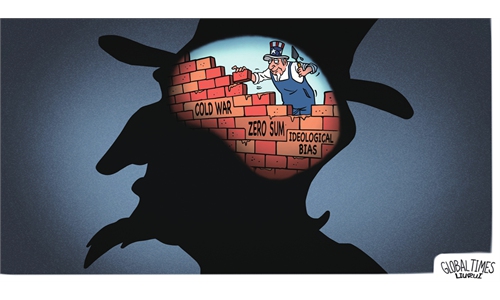
Kurt Campbell Photo: AFP
On Wednesday, US President Joe Biden nominated Kurt Campbell as the deputy secretary of state. Meanwhile, US Secretary of State Antony Blinken and Defense Secretary Lloyd Austin will attend the 2+2 Ministerial Dialogue in New Delhi next week to discuss "concerns and developments in the Indo-Pacific." Despite facing numerous crises and challenges, Biden's strategic focus remains on great power competition. Experts warn that if Biden continues to obsess with group confrontation, attempts to start a "new cold war" and contain China, the Biden administration will inevitably experience policy failures.During the Obama administration, Campbell served as an assistant secretary for Asian affairs at the US State Department. As a key member of the Biden administration team, Campbell was involved in rebuilding the Quad and facilitating the AUKUS, playing a central role in formulating China and Indo-Pacific policies at the National Security Council. US media believe that Campbell's appointment as the No.2 official at the State Department will "give some sense of confidence" that the US government is committed to advancing and implementing its Indo-Pacific Strategy.
Some US think tank analysts have said that "his nomination as the No.2 at the State Department is a clear testament of the importance of the region, and China in Biden's foreign policy." Campbell's nomination aims to deepen partnerships among allied countries in the region, with the implicit goal of countering the rise of China.
It's easy to discern the foreign policy focus of the Biden administration. Despite facing urgent challenges such as the Russia-Ukraine conflict and the escalating conflict between Israel and Hamas, the long-term goals and focal region for the US remain in the Indo-Pacific region. Li Haidong, a professor at the China Foreign Affairs University, told the Global Times (GT) that US' foreign policy focus reflects Washington's obsession with group confrontation, Cold War thinking, and attempts to start a "new cold war" rather than creating a stable pattern of enduring China-US relations.
For the US, whether in the government or Congress, in diplomacy or domestic affairs, its obsession is pursuing a strategy of containment toward China, treating China as a systemic competitor. The US wants to engage in a "new cold war" with China, while China refuses to define China-US relations in terms of "a new cold war." The US policy toward China reflects a great fear of China's development, and the constant hype of the China threat theory stems from a lack of confidence. Song Zhongping, a Chinese military expert and TV commentator, believes that in order to maintain its global hegemony, the US will inevitably comprehensively contain what it perceives as enemies. "As China's strength continues to increase, the US containment of China will become more apparent," Song said.
There have been some signs of easing tensions in China-US relations recently, and it is possible for China and the US to hold a summit. Li believes that China emphasizes cooperation in China-US relations, while the US emphasizes competition. If China has a decisive influence on China-US relations, then the future of China-US relations will be positive; if the US has a decisive influence, then China-US relations will be confrontational. Shao Yuqun, deputy researcher at the Americas Center of the Shanghai Institute of International Studies, said that, as the US is about to host the APEC summit, the Biden administration should implement the consensus reached between the leaders of China and the US during their meeting in Bali and strive to improve bilateral relations.
Nevertheless, the nomination of Campbell indicates that the current depth and focus of US foreign strategy are still in the Indo-Pacific region. Song believes that if Campbell becomes the deputy secretary of state, he will continue a tough stance on China, which also aligns with Biden's Indo-Pacific Strategy. "Regardless of who holds these important positions in the US, their policy toward China will not undergo fundamental changes," Song said. "Campbell is from the old era, someone who still lives in the shadow of the Cold War, not a person of the new era," Li told to the Global Times. If the Biden administration clings to Cold War thinking and attempts to start a "new cold war" in order to maintain its global hegemony, it will inevitably experience failures in its China strategy.



